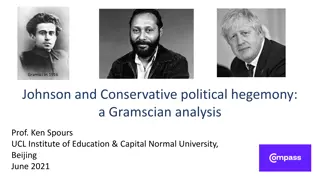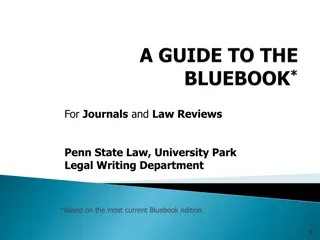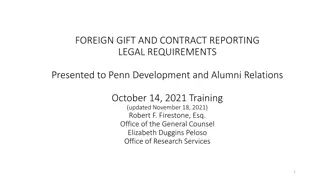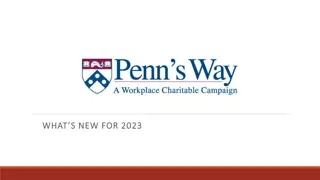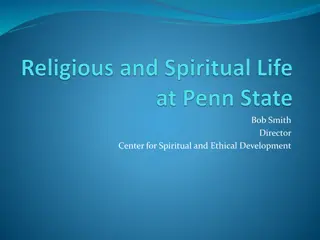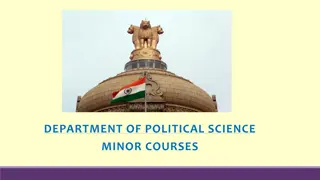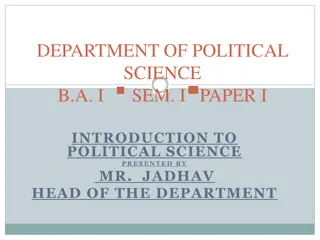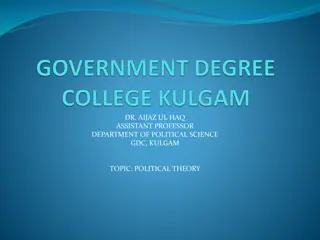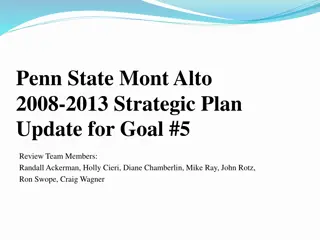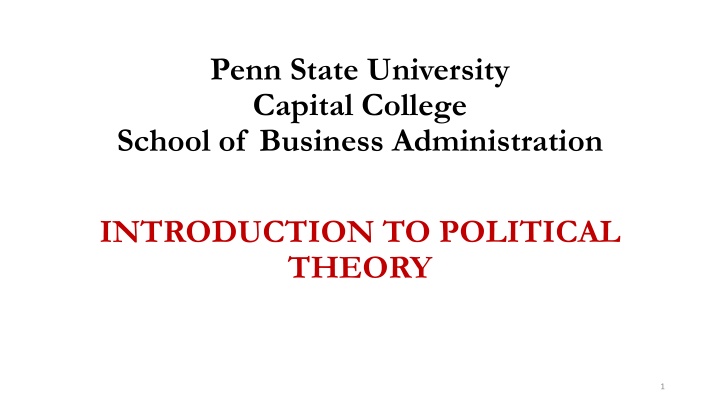
Introduction to Political Theory at Penn State University
This course delves into the core challenges of business ethics, exploring concepts like ethical relativism, universal standards, and ethical egoism. It questions the oxymoron of business ethics and examines the importance of words in shaping ethical decision-making. Through insightful discussions and critical analysis, students are challenged to reconsider their perspectives on morality in business.
Download Presentation

Please find below an Image/Link to download the presentation.
The content on the website is provided AS IS for your information and personal use only. It may not be sold, licensed, or shared on other websites without obtaining consent from the author. If you encounter any issues during the download, it is possible that the publisher has removed the file from their server.
You are allowed to download the files provided on this website for personal or commercial use, subject to the condition that they are used lawfully. All files are the property of their respective owners.
The content on the website is provided AS IS for your information and personal use only. It may not be sold, licensed, or shared on other websites without obtaining consent from the author.
E N D
Presentation Transcript
Penn State University Capital College School of Business Administration INTRODUCTION TO POLITICAL THEORY 1
Agenda Introductions Genesis of this project The Three Perennial Challenges to Business Ethics Is Business Ethics an Oxymoron? Is Ethics Relative? What are its limits? Are there any universal ethical standards? Are there any sources of the principles that allow us to judge actions of other people and societies? Is Ethical Egoism a bonafide ethical theory?
Genesis of this Project An insightful question by a student. Going back to the basics. WHY? Crucial Concepts: Self-interest, selfishness The Invisible Hand Purpose of Business Place of Business in Society
Is Business Ethics an Oxymoron? Assumption of the statement Non-transferability of moral/ethical standards Result of the statement Justification of asocial, unethical behavior My attempt Reiterate the original philosophy Challenge the Endoxa
Importance of Words and link with Actions Concepts and words and their link with our thought processes needed to create an ethical ecosystem We all perceive, frame, and interact with the world through conceptual schemes modified by mental models Words, terms, beliefs, and perspectives, provide those mental models Mental models impact actions
Importance of Words and link with Actions Even though the recall decision for Ford Pinto obviously had ethical overtones the schema that was driving the perceptions of the decision-makers precluded assessment of the issue in ethical terms Ford atmosphere did not include ethical dimensions and hence a gap was created between personal morality and business decisions (Werhane, 2002)
Importance of Words and link with Actions Language may constrict or expand our imagination The role of Moral Imagination Consequences of Business Ethics is an Oxymoron
Ideological Underpinnings of the Statement The statement does seem intuitive but does not tell the whole truth Can be broken down into three pivotal ideas: Self-interest is the only motive that reigns supreme in the economic realm. The only purpose of business is to make money for its shareholders. Business is an activity in which regular ethics or morality does not apply. Need to ascertain place and role of Business in society
Self-Interest In the economic realm the idea is linked with Adam Smith s the Wealth of Nations Mistakenly interpreted as a paean to self interest and ethics free economics Amartya Sen an economist and a Nobel Laureate, adapts a Shakespearian aphorism thus while some men are born small and some achieve smallness, the unfortunate Adam Smith has had much smallness thrust upon him
Self-Interest Why was Smith misinterpreted Misread and supported by Corporate America Transformation of economics into a more precise and then a scientific discipline It is not from the benevolence of the butcher, the brewer or the baker, that we expect our dinner, but from their regard to their own interest . . . We address ourselves not to their humanity but to their self-love, and never talk to them of our own necessities but of their advantages. He generally indeed, neither intends to promote the public interest, nor knows how much he is promoting it . . . and by directing that industry in such a manner as its produce may be of the greatest value, he intends only his own gain, and he is in this, as in many other cases, led by an invisible hand to promote an end which was no part of his intention. Nor is it always the worse for society that it was no part of it. By pursuing his own interest,he frequently promotes that of the society more effectually than when he really intends to promote it. Adam Smith Wealth of Nations
Self-Interest Debate in Smith s era Smith was against the Mercantile system of his time We need to go beyond this one statement How selfish so ever man may be supposed, there are evidently some principles in his nature, which interest him in the fortune of others, and render their happiness necessary to him, though he derives nothing from it except the pleasure of seeing it Adam Smith The Theory of Moral Sentiments
Self-Interest TMS and WN have ideological consistency Difference between selfishness and self-interest Smith had cautioned against the free pursuit of limitless self-interest. He noted that there are two motives for human actions self-interest and concern for others, which he called sympathy . He believed that sympathy will check the self-interest when it is at the expense of others or when justice or fairness demanded it.
Self-Interest THE INVISIBLE HAND Invisible Hand requires several conditions to operate that are embedded in morality THE NORTHSTAR ARGUMENT Epictetus of Hierapolis and Cicero Suffers from the blind spot of all Utilitarian theories
Self-Interest Smith supported this due to his aversion to the mercantile system and to create wealth for all to create a viable flourishing society Smith was concerned with so many issues that no one todays talks about We need to realize that Smith provided a place of ethics in the capitalist economy, and some might even argue that it was a dominant place
Purpose of Business Purpose or Telos, as the old Greeks called it, allows us to understand why an institution is created. Motive, on the other hand, represents a mechanism that is based on emotional and other reasons and stimulates people to act. Both purpose and motives can be different but may be used to explain why something is done. Example: Journalism
Purpose of Business The connection between how we see business and its role and its link with expectation from business Difference between Society and Business Society is natural and perfect (Aristotle) Created for Common Good (Aristotle) Business is unnatural and imperfect Business is a social institution and was created by the society so that the members of the society could benefit from it through the satisfaction of several human needs, including but not limited to profit.
Purpose of Business No society creates an institution unless that institution serves the broader goals of that society. In essence, society or state is the bigger and more important unit. BUT WHAT ABOUT THE RIGHT TO PROPERTY John Locke s Treatise on Government Life, Liberty, and Property are natural rights Curtailed only by a legitimately constituted government [consent, non-arbitrary laws, majority rule, and protection of fundamental rights]
Purpose of Business WHAT IS COMMON GOOD Profit? Goods and services? Mutual benefit of all business and societal stakeholders? Continued moral dialogue Evolving relationship with society Limited resources and the stake of society in business Business and societal interdependence Role of business in human flourishing
Descriptive Analysis of the Statement BUSINESS A SEPARATE REALM The last link in the chain is a descriptive argument that business exists in a separate realm from our social and personal life hence normal commonsense morality does not apply to it. The Albert Carr argument Can someone really achieve this strict compartmentalization? But when you read Carr s article you realize that criminals might utilize a similar strategy to eschew all charges of antisocial, criminal, and harmful behavior by believing that their business is a game in which moral norms of social life do not apply.
Descriptive Analysis of the Statement Issue of Transferability of moral standards, i.e., Separation Thesis Implications Ethics free business Convolutes the idea of normative standards Business are independent entities Objections Logical fallacy Creation of values in any transaction is inevitable Values are inextricably embedded in the social context
Descriptive Analysis of the Statement Ignores interdependence Wealth creation for whom? Why do business insist on establishing values. Some possible sources of confusion What about instrumental ethics?
Descriptive Analysis of the Statement But does business really encourage lying? If lying was permissible, then: Why would businesses lose their reputation and endure negative impact on their bottom-line due to lying. If lying was acceptable then the value of promises both explicit and implied would end in business. The value of the term good faith , which is an important presupposition of business transactions would be abolished. Isn t even providing misleading information in some industries like the pharmaceutical industry intolerable. Even advertising, notwithstanding the hyperbole involved, needs to provide trustworthy and useful information to be effective. If all advertising is lies and everyone knows and is fine with it then why would advertising be useful and why would companies spend so much money on it.
Descriptive Analysis of the Statement Finally, if Carr s view is correct then the question is that why would people want to be managers? Because it would seem that all managers would need to sell their souls to do well in their profession? The fact is that the business world does not subscribe to a universal standard of immortality. The business world is in fact a part of the society and general ethical principles like building trust, truth telling, fulfilling promises, and meeting contractual obligations that apply to all other societal institutions, do also apply to business.
Is Business Ethics an Oxymoron? The issue is not that all businesses are unethical but that we need to make ethical behavior the dominant norm. We can achieve this by creating an ecosystem that allows business practitioners to discuss business issues in ethical terms without being denounced as impractical or idealistic. We need to make ethics a part of common parlance to ensure that our business decision-makers develop abilities to discern ethical issues, analyze business issues from an ethical lens; and develop an overall appreciation of living an ethical life.
Boundaries of Relativity Claim of cultural relativity Different societies have different moral codes There is no objective standard to judge one societal code form another Moral codes of our society have no special status There is no universal truth in ethics Moral codes of a society determine what is right in that society It is arrogance to judge others
Boundaries of Relativity The cultural difference argument The conclusion does not follow from the premise. The premise could be true but not the conclusion Price of taking it seriously We cannot say that the moral principles of other societies are inferior We could decide what is right and wrong by consulting our societal standards The idea of moral progress in called into doubt CONCLUSION 1: THERE IS LESS DISAGREEMENT THAT IT SEEMS [DEEPER VALUES AND ARTIFACTS]
Ethics and Morality What is the difference between ethics and morality? Deeper, core principles Ethical standards may vary as they represent a broad principles based on intended work, organizational purposes, and intentions/need behind human aggregations Some common goals but different assumptions and different foundational principles
Boundaries of Relativity If you want to create a democratic state that intends to benefit all citizens, what principles would you use as the foundational assumptions of this state? Would you have the principle of the protection of life, liberty, property, and pursuit of happiness [As the basic principles] [These principles have been discussed in detail and accepted by several scholars over the centuries who have discussed human development from the state of nature to developing a society the prominent among them are the Contractees: Thomas Hobbes, John Locke, Jean Jacques Rousseau, Montequieu, and Robert Nozick]
Boundaries of relativity So if we argue that whenever we need to develop a society to perform specific purposes of a democratic state then would we need similar structures, laws, attitudes, and ethics? Core similarities with some different practices and methods Rule of Law Equal opportunities The availability of negative and positive rights Access to political process Access to political offices Voice, basic rights, equal treatment before law, etc. [Even Monarchies and Aristocracies, when they wanted some semblance of good rule followed similar principles and created similar institutions to some extent]
Boundaries of relativity The Crux is that: There is something called Institutional Logic that means that when you want to create institutions with similar purposes then you will need similar foundational principles and structures John Dunlop (1960): Logic of Industrialization DiMaggio & Powell (1983); Organizational Isomorphism [The Iron Cage of Institutions] [Coercive, mimetic, normative] Similar core with may be different practices We are interested in viable firms; there is also Equifinality when we need to create successful firms. Ethical standards can change based on the route taken for success [Today CSR is at a premium; you could still be running a trading floor, etc.] CONCLUSION 2: COMMON INSTITUTIONAL PURPOSES CREATE ETHICAL SIMILARITIES IN ORGANIZATIONS
Are there any Universal norms, if so, then why? Are there any universal moral/ethical standards for societies and even firms? If yes, then where do these principles come from?
Are there any Universal norms, if so, then why? Universal Hypernorms Evidence from the changes in the last few decades Today there are several universal standards in terms of national laws, international laws, corporations, work conditions, interaction of countries, political rights and duties----As evidenced by: UN Conventions on Human Rights EU Conventions on Human Rights and Environment International Court of Justice (e.g., The Nuremburg Trials) World Bank Standards OECD country standards on child labor and human rights International Labor Standards (the eight core standards) The Global Compact CERES, several ISO standards on different industries and environment CONCLUSION 3: THERE ARE SOME ACCEPTED UNIVERSAL NORMS CALLED HYPERNORMS
Are there any Universal norms, if so, then why? Can we judge anything as write from wrong? If so, then why? Based on the purpose of the institutions yes, we can [as already discussed] But can we go beyond organizational purpose and assess right from wrong actions or acts of institutions or individuals? One way to do so is to judge actions based on the hypernorms. But then the question is what is the source of these hypernorms OR why they are a standards? Example of two institutions: INSTITUTION 1:The framers of the constitution of United States who built an institutional structure on the assumption that all people are equal, and any government should provide all the right to LIFE, LIBERTY, PROPERTY, AND PURSUIT OF HAPPINESS
Universal Moral Standards an Analysis at the Macro Level INSTITUTION 2: The drug empire and later the cartel created by Pablo Escobar based on the assumption that the only important thing is to make money through any source and built on the principles of personal loyalty to Escobar, corruption, violence, disregard of general human welfare, etc. Now, which institution was moral or ethical? In most cases, people would agree that the Framers of the US constitution were creating an institutional structure on moral and ethical principles as compared to Escobar s drug empire. The important question: Is a democratic state better for people at large than a drug empire? IF SO, THEN WHY?
Universal Moral Standards an Analysis at the Macro Level Imagine if Escobar had enough people and land under his control to be considered as a country Would he have (or even agreed to): Been fair to all? Instituted rule of law? Imparted education to all? Provided equal opportunities for all occupations and carriers? Provided negative and positive freedoms to all? Allowed self-actualization to all? Allowed all other business and enterprises to flourish? Developed a pluralistic society that checks concentration of power? Protected the LIFE, LIBERTY, and PROPERTY of all?
Are there any Universal norms, if so, then why? But why a democratic state and the principles of life, liberty, property (and other principles given in the previous slide) are important principles? CONCLUSION 4: THESE PRINCIPLES EMANATE FROM BASIC HUMAN NATURE AND FUNDAMENTAL NEEDS [The above answer is based on the collective work of several scholars over centuries in the fields of Political Science, Social and Individual Psychology, Sociology, and Anthropology]
Universal Moral Standards an Analysis at the Macro Level Political Science: [Hobbes, Locke, Rousseau, Nozick] Why individuals created a state? It was inevitable due to population increase, and movement of people and people coming into contact with others Needed to fulfill basic physiological and safety needs Needed for fulfilling all other needs as we are not entirely self- sufficient as individuals The state was then voluntarily created by free individuals who had their basic equal natural rights through a social contract [Individuals will relinquish some part of their natural rights to attain common benefits that they did not have in the state of nature] In essence: common protection, common needs, property rights, rule of law----Hence, concepts of justice, fairness etc. are important
Universal Moral Standards an Analysis at the Macro Level Psychology: Humans are social animals and want to fulfill their needs of social interaction [Aristotle] The general need for order and predictability through institutions [Max Weber]. We always create institutions to avoid chaos and lawlessness Self-actualization is important to us. Once we have achieved our basic needs then we need to go up the need hierarchy and achieve actualization. Theories on human motivation and several go back a hundred years but one aspect of all these theories has been common humans are happiest when they achieve self-actualization [Maslow, McGregor, Herzberg, McClelland, Bandura, Adam, and Vroom] All the above is possible when generally institutions exist that allow for equal opportunities, fairness, rights, and law etc.
Universal Moral Standards an Analysis at the Macro Level Sociology and Anthropology: [Max Weber, Emile Durkheim] Humans have made the most progress when humans settled down after the agricultural revolution This revolution allowed humans to go from the fulfillment of their basic needs to higher purpose needs This was the time that institutional, legal, and ethical sophistication was achieved [as societies got more complicated] Anthropological studies have shown that societies that had foundational principles that are close to human nature and need created thriving collectives.
Universal Moral Standards an Analysis at the Macro Level Different branches of knowledge point to a few important aspects: We need social interaction and societal structures We are all generally motivated to achieve self actualization We enter society to fulfill basic needs We strive in society to achieve our needs Therefore, we need stable, orderly social collectives that provide opportunity, protection, basic rights, and fairness AND that is why at the very basic level the rights of LIFE, LIBERTY, and PROPERTY are important
IS IT ALL RELATIVE THEN? CONCLUSION 1: THERE IS LESS DISAGREEMENT THAT IT SEEMS [DEEPER VALUES AND ARTIFACTS] CONCLUSION 2: COMMON INSTITUTIONAL PURPOSES CREATE ETHICAL SIMILARITIES IN ORGANIZATIONS CONCLUSION 3: THERE ARE SOME ACCEPTED UNIVERSAL NORMS CALLED HYPERNORMS CONCLUSION 4: THESE PRINCIPLES EMANATE FROM HUMAN NATURE AND NEEDS




